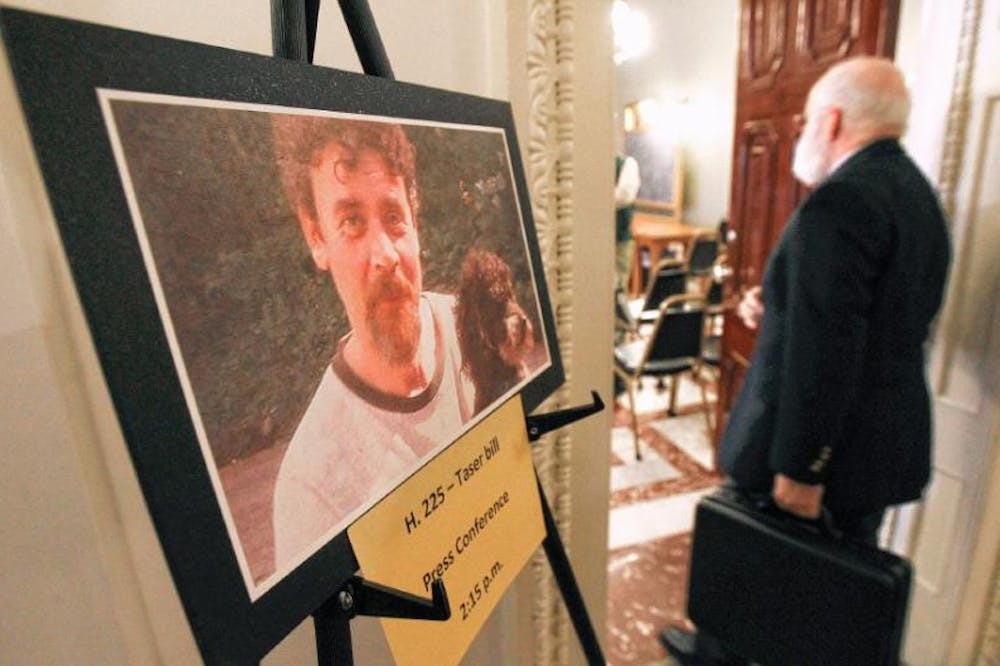On Wednesday, April 9, Vermont Senate Government Operations Committee considered new legislation that would regulate taser use across Vermont.
Bill H.225, already passed by the house, would implement statewide training standards for all law enforcement officials armed with electronic control devices (ECDs).
According to the proposed bill, “The Criminal Justice Training Council shall ensure that a law enforcement officer receives appropriate and sufficient training before becoming authorized to carry or use an electronic control device.”
The weapons induce involuntary muscle contractions, enabling the an officer to safely apprehend the suspect. Concomitantly, the shock can disrupt basic neurological functions, causing seizures, heart attacks and even death. Despite this risk, ECDs are often praised as a safe alternative to traditional firearms.
Jim Masland (D-Thetford) proposed the bill. Masland witnessed ECD’s lethality last summer, when his neighbor was killed by a taser.
Macadam Mason, a 39 year-old man with a history of mental illness, threatened to commit suicide. Officers arrived quickly at Mason’s Thetford home, but he refused to comply and moved toward one officer with ‘clenched fists.’ Moments later, the officer fired a taser that disrupted Mason’s heart and ended his life.
Masland attributes the accident to inadequate training and improper protocol. Communicating with mentally ill citizens is a particularly delicate skill that requires special training.
“It’s clear that what we really need is for all officers to have the same training, having to deal with individuals having a mental health crisis,” Masland said.
Accordingly, one of the bill’s newer provisions requires that any officer hoping to carry a taser undergo Act 80 training. This training focuses on de-escalation and non-violent intervention.
If the bill passes, by the end of June, 2017, “every State, local, county, and municipal law enforcement agency” must ensure its officers complete training outlined in 2004 Acts and Resolves.
The bill directly references the challenges that Masland describes: "The use of electronic control devices shall include recognition of the heightened risk that misuse can result from situations in which subjects have cognitive disabilities or are in emotional crises that interfere with the ability to understand consequences of action."
The training will be overseen by The Criminal Justice Training Council (CJTC).
According to their website, CJTC aims to “ ... enhance public safety and promote law enforcement excellence by establishing policies, certification standards, training, and resources that embrace best practices in criminal justice.”
Critics of the bill have cited its rigidity as a weakness. Instead of codified taser protocol, the bills' opponents stress the importance of an officer’s personal discretion.
“[The bill] leaves no room for the officer to make a judgement,” said representative Donna Sweany (D-Windsor).
Representative Joanna Cole (D-Burlington) was worried that the bill was too broad and stripped of essential provisions.
“I wanted to see something much stronger,” she stated.
Other opponents are concerned that the bill will propagate the myth that tasers are safe, and will tacitly condone irresponsible taser use.
“I think the bill makes the situation worse,” said Defense Attorney Robert Appel, the former head of the Vermont Human Rights Commission. “They’re codifying a poor public policy ...”
Appel described the bill as giving officers the “green light” whenever they anticipate violence. “I would rather see them do nothing than pass this language,” he said.
Winooski Police Chief Steve McQueen recognizes the difficulty in applying a blanket solution to a complex dilemma. "Trying to come up with a piece of legislation that says 'you will do A, B, and C under A, B, and C set of circumstances,'" stated McQueen, "is extremely difficult to do, and I would discourage you from doing it."
The current bill allows an officer to use a taser whenever a suspect actively resists arrest — a relatively opaque definition. “Active resistance includes something as simple as pulling your arms across your chest,” noted Allen Gilbert, the executive director of the Vermont chapter of the ACLU. “This is a very low threshold.”
Furthermore, the proliferation of such high-tech weaponry has financial repercussions. In a study released by the ACLU, the state has paid approximately 269,000 dollars in seven different settlements since 2004.
“Tasers are powerful weapons that should only be deployed in unusual circumstances,” Gilbert told the Senate committee on Wednesday.
Governor Shumlin noted that although ECDs are dangerous, they are relatively safe if used correctly.
“Anything can kill someone,” he stated in a June press conference. “It depends how you use it. The point is, Tasers are less likely to kill you than a bullet, which is why we use them.”
Proposed Legislation Mandates Taser Training

Comments



